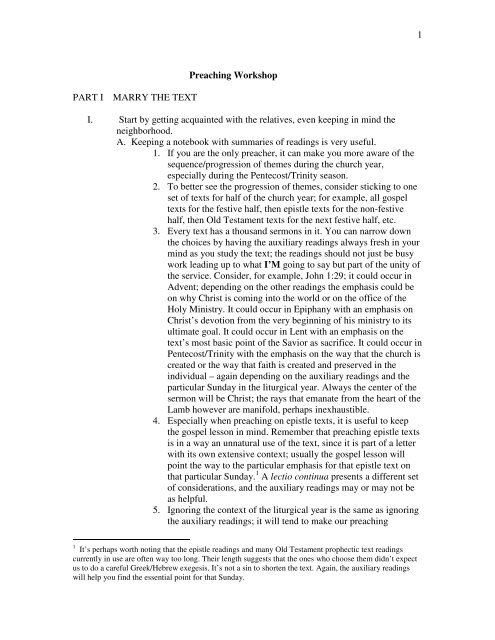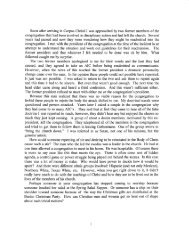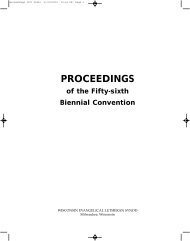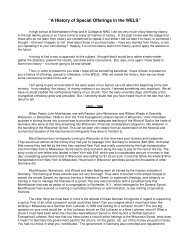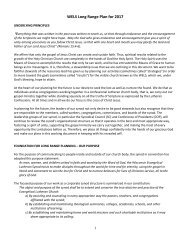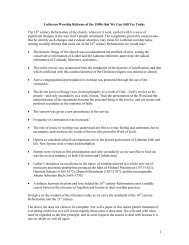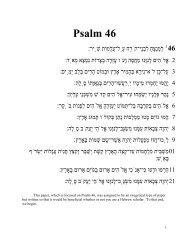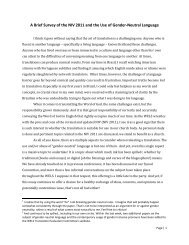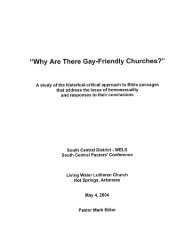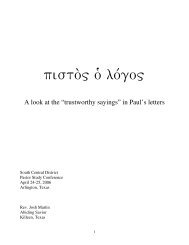Preaching Workshop â Prof. Daniel Deutschlander
Preaching Workshop â Prof. Daniel Deutschlander
Preaching Workshop â Prof. Daniel Deutschlander
You also want an ePaper? Increase the reach of your titles
YUMPU automatically turns print PDFs into web optimized ePapers that Google loves.
1<br />
<strong>Preaching</strong> <strong>Workshop</strong><br />
PART I<br />
MARRY THE TEXT<br />
I. Start by getting acquainted with the relatives, even keeping in mind the<br />
neighborhood.<br />
A. Keeping a notebook with summaries of readings is very useful.<br />
1. If you are the only preacher, it can make you more aware of the<br />
sequence/progression of themes during the church year,<br />
especially during the Pentecost/Trinity season.<br />
2. To better see the progression of themes, consider sticking to one<br />
set of texts for half of the church year; for example, all gospel<br />
texts for the festive half, then epistle texts for the non-festive<br />
half, then Old Testament texts for the next festive half, etc.<br />
3. Every text has a thousand sermons in it. You can narrow down<br />
the choices by having the auxiliary readings always fresh in your<br />
mind as you study the text; the readings should not just be busy<br />
work leading up to what I’M going to say but part of the unity of<br />
the service. Consider, for example, John 1:29; it could occur in<br />
Advent; depending on the other readings the emphasis could be<br />
on why Christ is coming into the world or on the office of the<br />
Holy Ministry. It could occur in Epiphany with an emphasis on<br />
Christ’s devotion from the very beginning of his ministry to its<br />
ultimate goal. It could occur in Lent with an emphasis on the<br />
text’s most basic point of the Savior as sacrifice. It could occur in<br />
Pentecost/Trinity with the emphasis on the way that the church is<br />
created or the way that faith is created and preserved in the<br />
individual – again depending on the auxiliary readings and the<br />
particular Sunday in the liturgical year. Always the center of the<br />
sermon will be Christ; the rays that emanate from the heart of the<br />
Lamb however are manifold, perhaps inexhaustible.<br />
4. Especially when preaching on epistle texts, it is useful to keep<br />
the gospel lesson in mind. Remember that preaching epistle texts<br />
is in a way an unnatural use of the text, since it is part of a letter<br />
with its own extensive context; usually the gospel lesson will<br />
point the way to the particular emphasis for that epistle text on<br />
that particular Sunday. 1 A lectio continua presents a different set<br />
of considerations, and the auxiliary readings may or may not be<br />
as helpful.<br />
5. Ignoring the context of the liturgical year is the same as ignoring<br />
the auxiliary readings; it will tend to make our preaching<br />
1 It’s perhaps worth noting that the epistle readings and many Old Testament prophectic text readings<br />
currently in use are often way too long. Their length suggests that the ones who choose them didn’t expect<br />
us to do a careful Greek/Hebrew exegesis. It’s not a sin to shorten the text. Again, the auxiliary readings<br />
will help you find the essential point for that Sunday.
2<br />
superficial, with a scatter gun approach to the text that misses its<br />
depth, its richness. 2<br />
B. A fundamental way of moving towards your marriage with the text is to<br />
ask it questions.<br />
1. What makes this text unique, or at the very least unique in its<br />
setting of that particular Sunday with its family of surrounding<br />
readings?<br />
2. If it is an O.T. Bible history text, why did God include this event<br />
in the Bible, of all the events that he could have included?<br />
What’s special about it, what eternal relevance does it have in a<br />
changing world? How is the character in his world like me/us in<br />
our world, and how does God deal with that character with the<br />
law and the gospel? How does the character reflect his times? In<br />
what particulars and specifics are these characters and their<br />
temptations like ours? E.g. the key to David’s fall is in the first<br />
verse of the chapter (2 Sam. 11:1). How are Samson’s<br />
temptations to the same kind of sins different? What about<br />
Solomon’s sins? Given the assumption that the Holy Spirit is not<br />
usually redundant, why does God repeat the exhortation to<br />
Joshua that he should not be afraid (Josh 1:6, 7, 9)?<br />
3. If the text is a miracle of our Lord or a parable, how is it unique,<br />
different from every other miracle or parable? For example, how<br />
is the healing of the one leper in Mark 1:40-45 different from the<br />
healing of the ten lepers in Luke 17:11-19? In the great parable<br />
chapter (Luke 15) what’s the difference between a lost sheep, a<br />
lost coin, a lost son? Note the rich variety in points of emphasis<br />
in the many parables about the Word as seed, about its nature as<br />
the ultimate source of the kingdom of God. How many different<br />
points of emphasis can you find in the the kingdom of<br />
God/heaven is like …<br />
2 If you read the sermons of the greats, e.g., Gerhard, C.F.W. Walther, George Stoeckhardt, you will find<br />
that they sometimes suggest in the introduction a number of points made by the text and then tell us which<br />
one they are going to concentrate on this Sunday.
3<br />
PART II MINE THE TEXT<br />
II.<br />
Dig into the text.<br />
A. Pay particular attention to the specific words the Holy Spirit has chosen<br />
and carefully note difference in emphasis in synonyms.<br />
1. Grace is not the same as love is not the same as mercy. Each of<br />
these words has a special and distinct emphasis. Consider St.<br />
Paul’s magnificent interplay with these words in Eph. 2:4-5.<br />
Even with the word love, there is a difference between agapao<br />
and phileo, and it is sometimes surprising to see where the one is<br />
used when we would have expected the other (e.g., Titus 3:4).<br />
Note too the vast difference between agapao in Greek and love<br />
in ordinary English usage - - Is love an emotion or a choice?<br />
Does it reside chiefly in the heart or in the will? What difference<br />
does it make?<br />
2. Note the difference in the different words for sin; when they are<br />
used in a sequence or in Hebrew poetry the difference between<br />
sin, transgression, and iniquity can be very rich; even the word<br />
sin can have an abundance of differing points of emphasis,<br />
depending on its context. Is sin an offense against God that needs<br />
to be punished? Is it a debt that needs to be paid? Is it a wrong<br />
that needs to be made right? Is it filth that needs cleansing?<br />
Consider all the questions in this point just with Psalm 51 and the<br />
point is made: God is indeed a rich master of language! We don’t<br />
want to short change his mastery by being careless in our<br />
examination of his choices.<br />
3. Pay attention to the syntax that the Holy Spirit has chosen to use;<br />
Greek word order is emphatic; Greek tenses are rich - - there is<br />
often a world of difference between an aorist and a perfect tense,<br />
e.g., It is finished. In the Old Testament notice the difference<br />
between will as a future tense and will as an expression of<br />
volition when God is the subject of the sentence. (Luther’s<br />
translation of the Old Testament is especially interesting in this<br />
latter regard.)<br />
B. Make it your concern to preach the text, rather than to preach about the<br />
text.<br />
1. As with the rich variety of emphasis in specific words, so also<br />
there is a rich variety in the presentation of specific doctrines.<br />
2. The doctrine of the forgiveness of sins can be spoken of as<br />
justification, as reconciliation, as atonement, as an expression of<br />
God’s grace, of his love, of his mercy or of his election; the<br />
doctrine can be expressed with words that serve as a key to<br />
heaven; it can be presented with shocking examples in Bible<br />
history texts (David and Nathan, as penitent and pastor), in heart<br />
wrenching parables (the Prodigal Son in the context of God’s<br />
family), the shocking beauty of God imitating man (the Fifth
4<br />
Petition!), the example of an aching heart that longs to forgive a<br />
brother (Paul and the Corinthian member in 2 Cor. 2); it can be<br />
the mind boggling picture of forgiveness in the sacraments - -<br />
one sacrament forgives even tomorrows sin, and the other<br />
assures me yet again of forgiveness for yesterday and today and<br />
forever; one sacrament made me holy, the other gives me the<br />
price of my salvation, my Savior himself, to keep me company<br />
all the way through the valley of the shadow of death!<br />
3. Use the imagery of the text itself; consider the ways that you<br />
might preach on the passage that Paul (Rom. 10:21) quotes from<br />
Isaiah (65:2), All day long … (The imagery in a language as<br />
concrete as Hebrew is especially noteworthy in contrast to the<br />
Greek love of abstractions.)<br />
4. In passage that deal with the doctrine of sanctification and in the<br />
law what’s the chief point of emphasis? Which use of the law do<br />
you want to emphasize in texts from the Sermon on the Mount?<br />
More than one? In epistle texts on sanctification, mischief gets<br />
done when law and gospel are confused or any use of the law is<br />
trivialized or negated by an inappropriate insertion of the gospel:<br />
WATCH OUT FOR THE LUTHERAN EARS SYNDROME!<br />
(Paul and the Confessions warn against it too: … those who live<br />
like this 3 will not inherit the kingdom of God – Gal. 5:21.<br />
Therefore, there is no true, saving faith in those who have no<br />
contrition and sorrow and who have the evil intention to remain<br />
and continue in sins. Instead, genuine contrition comes first, and<br />
true faith is found in and with true repentance – F.C., S.D., Art.<br />
III, 26 [Kolb, p. 566].)<br />
5. The point is that while the Holy Spirit is not redundant, he is<br />
rich, rich, rich, in the variety of ways that he can say the same<br />
thing. If we stick to the text, we will not be any more redundant<br />
than the Holy Spirit is; so preach the text, not about the text.<br />
6. When we mine the text, by means of the Word we climb into the<br />
heart of God where he shares it all with us (cf. Jn. 15 esp. vs. 15-<br />
16 4 ). When we mine the text, we come back from the heart God<br />
and speak his heart into the heart of those who hear us. That’s<br />
way too important a matter and way too beautiful to subject it to<br />
3 The Greek participle translated in the NIV as those who live like this is from the verb prasso, not the verb<br />
poieo; the contrast in meaning and use in the New Testament is an important one for keeping law and<br />
gospel properly distinguished. Notice the usage of the participles of both verbs in Jn. 5:29.<br />
4 As an interesting digression: Note the two very different Greek words that God uses for friend in the<br />
gospels. The one we would expect to be used is in Jn. 15; but a very different one occurs three times in<br />
Matthew, in 20:13, 22:12, 26:50. While translations give the word as friend, comrade, the root meaning of<br />
the word lends a much more pungent implication to the word, an implication that might sharpen ones use of<br />
the text in preaching. It is well and often said that word study is not the beginning and the end of a good<br />
sermon. But word study is a beginning, a good beginning, a beginning that may well deepen the preacher’s<br />
appreciation for the language that God has chosen as the necessary vehicle for imparting grace and<br />
salvation.
5<br />
expression in the pulpit that is merely cute or clever or just<br />
amusing.<br />
C. If the exegetical/expository part of the sermon is textual, introductions and<br />
applications will be too.<br />
1. The common lament of many pastors is that they have difficulty<br />
with the introduction to the sermon. If you mine the text and<br />
marry it as well, any number of introductions may suggest<br />
themselves either from the auxiliary readings or from Bible<br />
history (cf. the example of Johann Gerhard).<br />
2. On the increasingly common habit of many to use the<br />
introduction as the place for their own autobiography …<br />
3. The best place to start in applying a text is, of course, with the<br />
text itself. If the text seems too broad or general, the second<br />
place to look is in the auxiliary readings. A third place to go for a<br />
start is the Table of Duties in the Catechism; for all of God’s<br />
Word applies to us collectively and individually according to our<br />
station in life. Consider, for example, how a text on the mercy of<br />
God might apply differently to parents and employers than to<br />
children and employees, to the wealthy and powerful than to the<br />
poor and the sick.<br />
4. Remember that the goal from introduction through application<br />
and conclusion is that the hearer should hear in the sermon an<br />
echo of the prophets, Thus says the Lord! If we write and preach<br />
so that they remember the text, then the seed has been planted<br />
and the Holy Spirit can do his work with it. 5 That’s his promise.<br />
He would not lie to us.<br />
5 Has it ever happened to you that weeks later someone comments on a sub point of a sub point that you<br />
made in a sermon as if it were the whole sermon? There was something there that the Holy Spirit used that<br />
you may not even have thought important, but it was important to that individual in his Sitz im Leben.<br />
Points from your autobiography will never have that effect, no matter how interesting you thought they<br />
were!
6<br />
PART III MIND THE TEXT - - in a liturgical and doctrinal context<br />
III. Keep in mind the basic rule that Theologia est habitus practicus!<br />
A. Spend a few minutes from time to time going through the liturgy and mapping<br />
out its doctrinal content.<br />
1. As with the Bible itself, it will not be a waste of time to consider the why<br />
of each line. E.g., Note the distinctions in the prayers of confession. Why<br />
do we have a salutation before the pastor prays? Why does the Creed<br />
follow the gospel lesson or the sermon? Why the three exchanges at the<br />
beginning of the Liturgy of the Sacrament? What doctrines lie hidden just<br />
under the surface? Is the Apostolic Greeting at the beginning of the<br />
sermon nothing more than a churchy hello? What about the blessing at its<br />
conclusion? What about the Benediction - - just a churchy goodbye? How<br />
many doctrines can you find in the common confession and absolution?<br />
How many in the Gloria in Excelsis?<br />
2. Every major doctrine has at least one place of emphasis in the Liturgy.<br />
That should be comforting to the preacher who always has reason to<br />
despair of his own feeble efforts in presenting clearly the truths of the<br />
gospel. In many times and places it has been the liturgy that kept faith<br />
alive, since the gospel was all but absent from the pulpit.<br />
3. Keep in mind that liturgical worship is and ought always to be<br />
Gottesdienst, chiefly God’s service to us in the Word and sacraments and<br />
secondarily ours to him in receiving what he has come to church to give<br />
us. Thus the liturgy is an integral part of the service, not just busy work<br />
leading up to what I’M going to say in the sermon.<br />
4. While not every sermon needs to make reference to some part of the<br />
liturgy, it might help our people appreciate its beauty and significance as a<br />
summary of everything that God has to say to us if from time to time we<br />
referred to it. A Bible class series every now and then devoted to a careful<br />
study of the meat and potatoes of our faith in the liturgy would be time<br />
well spent. And time devoted to a consideration and teaching of this<br />
historic 2000 years-in-the-making Western Rite will for most be time<br />
better spent than that devoted to re-creating the wheel.<br />
B. Mind the text in doctrinal sermons.<br />
1. The benefit of using a pericope series is that it makes doctrinal preaching<br />
easier. Every season has its specific set of doctrinal emphases that should<br />
keep the preacher from the temptation of “grinding an axe” in the manner<br />
of many of the sectarians.<br />
2. The progression through the church year is an orderly one, even though<br />
points of emphasis may vary from pericope series to pericope series. The<br />
doctrinal progression is fairly easy to follow in the Festival Half.<br />
3. In the Pentecost/Trinity cycle there is a fairly but not slavishly consistent<br />
progression of emphases 6 : The doctrine of the Means of Grace by which
7<br />
the church is created; the doctrine of the Una Sancta (sometimes these first<br />
two occur in reverse order with effect first and then a consideration of<br />
cause/means); some series begin the non-festive half with the emphasis on<br />
the faith of the individual, its creation and attributes; then comes variously<br />
emphasis on its fruits in good works or in the life/growth of the church;<br />
finally a consideration of Last Things immediately after the Reformation<br />
and All Saints feasts. These last two feasts before the consideration of Last<br />
Things can serve as summaries of the whole Pentecost/Trinity season. Last<br />
Things sermons need to be planned so that the coming Advent season’s<br />
readings and sermons do not prove to be redundant.<br />
4. There are a number of doctrines that come up more than once, but each<br />
time with a special twist from the season of the year. There is, for<br />
example, an emphasis on the holy office of the ministry on either the Third<br />
or Fourth Sunday in Advent (both its great glory and its lowliness as<br />
exemplified in St. John the Baptist), and usually another during the first or<br />
second cycle of readings in the Pentecost/Trinity (with an emphasis on its<br />
importance as a divine institution for the public proclamation of the gospel<br />
in the creation or preservation of the church in general and of faith in the<br />
individual). There is an emphasis on the family on at least one of the<br />
Sundays in Epiphany (the boy Jesus in the Temple or the Miracle at Cana),<br />
and then usually again somewhere in the third cycle of Pentecost/Trinity.<br />
5. If a doctrine comes up only once, the preacher may want to take special<br />
note of it in the sermon or at least in the bulletin. The doctrine of the<br />
angels, for example, could find its way into the Christmas story, the<br />
Passion history and the Easter story; but what we have to consider on<br />
those days is so much more important that the angels get lost in the<br />
shuffle, so to speak. All the more reason to consider them on the Feast of<br />
St. Michael, especially since false teachings about the angels are becoming<br />
popular these days.<br />
C. Our goal is to present yearly the whole counsel of God for us and for our<br />
salvation.<br />
1. Remembering the doctrinal content of pericope texts and preaching it<br />
helps to keep us from becoming sectarian in our preaching; a hallmark<br />
of sectarian preaching is that in the name of being practical it has its<br />
focus on the third use of the law and ignores the analogy of faith.<br />
2. It helps keep our members as well as ourselves aware of the truth that<br />
doctrine is always law and gospel, is always ultimately practical, is<br />
always whole cloth.<br />
6 Often the readings for Pentecost/Trinity will follow an approximately seven week cycle, with a shift of<br />
focus every seven weeks or so. One of the more interesting features in many series is a Sunday either at the<br />
end of the first cycle or near the beginning of the second cycle that has readings with a strong emphasis on<br />
purity of doctrine; I like to call that Sunday “Orthodoxy Sunday.” In Series B it happens to be the Ninth<br />
Sunday after Pentecost; Series A and C could also have that as the theme; in the Ancient Church series it’s<br />
the Eighth Sunday after Trinity. For examples of how the themes can be worked out progressively through<br />
the whole of the church year, cf. the series published by the Commission on Worship, Planning Christian<br />
Worship; there are suggested themes for each Sunday of the A, B, and C cycles printed on pp. 163-166 in<br />
the front of the hymnal.
8<br />
3. The role of polemics in the pulpit: A good shepherd warns the sheep<br />
and guards them against the poison of false doctrine and the jaws of<br />
the wolf (Matt. 7:15, Ezekiel 13 and so often elsewhere in Ezekiel;<br />
note especially God’s charge in Ezekiel’s call in chp. 2 - - Warn<br />
whether they listen or do not listen!) In it all we follow the example of<br />
St. Paul speaking the truth in love (Eph. 4:15) with no sacrifice of<br />
either. We serve under the cross, in imitation of Christ’s state of<br />
humiliation; we’re not in heaven yet.<br />
4. Conclusion caution # 1: When preaching textual and doctrinal sermons<br />
- - and the terms should be all but interchangeable - - be aware that<br />
there are two people in church: One is in despair and the other one<br />
ought to be. Doctrinal sermons preach to both. Remember the rule in<br />
the Confessions: Sound doctrine has three marks; it is scriptural; it<br />
gives maximum glory to Christ; it comforts the sinner in his<br />
temptations and afflictions (Anfechtungen).<br />
5. Concluding caution # 2: Doctrines are like great pillars that hold up the<br />
church; each one must be respected both in its wider context and in its<br />
uniqueness; by both God makes a mockery of rationalism while he<br />
puts reason to its best and most sublime use. It is one of the great<br />
hallmarks that God has given to us as confessional Lutherans that we<br />
delight in both. Thus for example, preach about prayer on Rogate<br />
Sunday and again when it comes up in the third or last cycle of<br />
Pentecost/Trinity without contradicting what God says about his<br />
providence in Romans 8; preach about the need to share the gospel on<br />
the Feast of Pentecost and elsewhere, but don’t deny the doctrine of<br />
election in the process - - and, obviously, when preaching the doctrine<br />
of election, don’t use it as an excuse to be lazy in evangelism; the<br />
gospel is not a license to sin and the law is not an excuse for either<br />
ultimate despair or for pride and self righteousness.<br />
Having done all these things, give thanks to God that none of the glory for the success<br />
of the gospel belongs to the preacher; it all belongs to him who gave it and has won<br />
us by it to love him and trust in his merit; having done all these things, give thanks to<br />
God that he has bestowed on vessels of clay the highest honor in the world, that of<br />
proclaiming him to the world; for by that proclamation and not apart from it he<br />
gathers in those whom he has chosen!
9<br />
WHY SHOULD I BOTHER THINKING ABOUT PREACHING OR LISTENING TO<br />
WHAT ANYONE ELSE HAS TO SAY ABOUT IT?<br />
Our Lord encourages us:<br />
Jesus said so often in the gospels and also in his closing letters to the church in<br />
Revelation that those who have ears should hear, should listen. It is to preaching that our<br />
people have the most frequent recourse when they want to hear Jesus speaking to them.<br />
Romans 10:17 Consequently, faith comes from hearing the message, and the<br />
message is heard through the word of Christ.<br />
1 Corinthians 1:21 God was pleased through the foolishness of what was<br />
preached to save those who believe.<br />
1 Timothy 4:11-16 Command and teach these things. … set an example for the<br />
believers in speech, in life, in love, in faith and in purity. Until I come, devote yourself to<br />
the public reading of Scripture, to preaching and to teaching. Do not neglect your gift …<br />
Be diligent in these matters; give yourself wholly to them, so that everyone may see your<br />
progress. Watch your life and doctrine closely. Perservere in them, because if you do,<br />
you will save both yourself and your hearers.<br />
Luther’s words in praise of preaching and in encouragement to preachers can fill a large<br />
volume. Nor are the Confessions lacking in such encouragement. One citation says it all:<br />
Smalcald Articles, Second Article, par. 24: Christ’s merit is not acquired through our<br />
work or pennies, but through faith by grace, without any money and merit – not by the<br />
authority of the pope, BUT RATHER BY PREACHING A SERMON, THAT IS, GOD’S<br />
WORD. (Kolb edition, p. 305)<br />
No more scathing indictment is there of frivolous preachers and preaching than that<br />
found in Dante’s Divine Comedy, (Paradiso, Canto XXIX, ll. 94-118, but especially as<br />
the sum of it, ll. 106-118:)<br />
“Therefore the ignorant sheep turn home at night<br />
from having fed on wind. Nor does the fact<br />
that the pastor sees no harm done set things right.<br />
Christ did not say to His first congregation:<br />
‘Go and preach twaddle to the waiting world.’<br />
He gave them, rather, holy truth’s foundation.<br />
That, and that only, was the truth revealed<br />
by those who fought and died to plant the faith.<br />
They made the Gospel both their sword and shield.<br />
Now preachers make the congregations roar<br />
with quips and quirks, and so [if] it laugh enough<br />
their hoods [i.e. heads] swell, and they ask for nothing more.”


